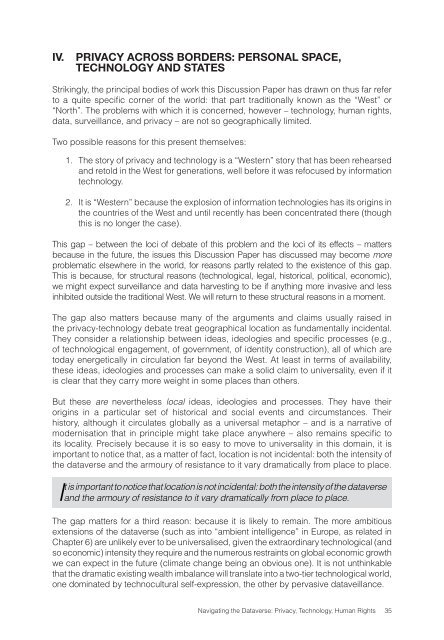Navigating the Dataverse: Privacy, Technology ... - The ICHRP
Navigating the Dataverse: Privacy, Technology ... - The ICHRP
Navigating the Dataverse: Privacy, Technology ... - The ICHRP
You also want an ePaper? Increase the reach of your titles
YUMPU automatically turns print PDFs into web optimized ePapers that Google loves.
IV.<br />
<strong>Privacy</strong> across Borders: Personal Space,<br />
<strong>Technology</strong> and States<br />
Strikingly, <strong>the</strong> principal bodies of work this Discussion Paper has drawn on thus far refer<br />
to a quite specific corner of <strong>the</strong> world: that part traditionally known as <strong>the</strong> “West” or<br />
“North”. <strong>The</strong> problems with which it is concerned, however – technology, human rights,<br />
data, surveillance, and privacy – are not so geographically limited.<br />
Two possible reasons for this present <strong>the</strong>mselves:<br />
1. <strong>The</strong> story of privacy and technology is a “Western” story that has been rehearsed<br />
and retold in <strong>the</strong> West for generations, well before it was refocused by information<br />
technology.<br />
2. It is “Western” because <strong>the</strong> explosion of information technologies has its origins in<br />
<strong>the</strong> countries of <strong>the</strong> West and until recently has been concentrated <strong>the</strong>re (though<br />
this is no longer <strong>the</strong> case).<br />
This gap – between <strong>the</strong> loci of debate of this problem and <strong>the</strong> loci of its effects – matters<br />
because in <strong>the</strong> future, <strong>the</strong> issues this Discussion Paper has discussed may become more<br />
problematic elsewhere in <strong>the</strong> world, for reasons partly related to <strong>the</strong> existence of this gap.<br />
This is because, for structural reasons (technological, legal, historical, political, economic),<br />
we might expect surveillance and data harvesting to be if anything more invasive and less<br />
inhibited outside <strong>the</strong> traditional West. We will return to <strong>the</strong>se structural reasons in a moment.<br />
<strong>The</strong> gap also matters because many of <strong>the</strong> arguments and claims usually raised in<br />
<strong>the</strong> privacy-technology debate treat geographical location as fundamentally incidental.<br />
<strong>The</strong>y consider a relationship between ideas, ideologies and specific processes (e.g.,<br />
of technological engagement, of government, of identity construction), all of which are<br />
today energetically in circulation far beyond <strong>the</strong> West. At least in terms of availability,<br />
<strong>the</strong>se ideas, ideologies and processes can make a solid claim to universality, even if it<br />
is clear that <strong>the</strong>y carry more weight in some places than o<strong>the</strong>rs.<br />
But <strong>the</strong>se are never<strong>the</strong>less local ideas, ideologies and processes. <strong>The</strong>y have <strong>the</strong>ir<br />
origins in a particular set of historical and social events and circumstances. <strong>The</strong>ir<br />
history, although it circulates globally as a universal metaphor – and is a narrative of<br />
modernisation that in principle might take place anywhere – also remains specific to<br />
its locality. Precisely because it is so easy to move to universality in this domain, it is<br />
important to notice that, as a matter of fact, location is not incidental: both <strong>the</strong> intensity of<br />
<strong>the</strong> dataverse and <strong>the</strong> armoury of resistance to it vary dramatically from place to place.<br />
It is important to notice that location is not incidental: both <strong>the</strong> intensity of <strong>the</strong> dataverse<br />
and <strong>the</strong> armoury of resistance to it vary dramatically from place to place.<br />
<strong>The</strong> gap matters for a third reason: because it is likely to remain. <strong>The</strong> more ambitious<br />
extensions of <strong>the</strong> dataverse (such as into “ambient intelligence” in Europe, as related in<br />
Chapter 6) are unlikely ever to be universalised, given <strong>the</strong> extraordinary technological (and<br />
so economic) intensity <strong>the</strong>y require and <strong>the</strong> numerous restraints on global economic growth<br />
we can expect in <strong>the</strong> future (climate change being an obvious one). It is not unthinkable<br />
that <strong>the</strong> dramatic existing wealth imbalance will translate into a two-tier technological world,<br />
one dominated by technocultural self-expression, <strong>the</strong> o<strong>the</strong>r by pervasive dataveillance.<br />
<strong>Navigating</strong> <strong>the</strong> <strong>Dataverse</strong>: <strong>Privacy</strong>, <strong>Technology</strong>, Human Rights 35
















